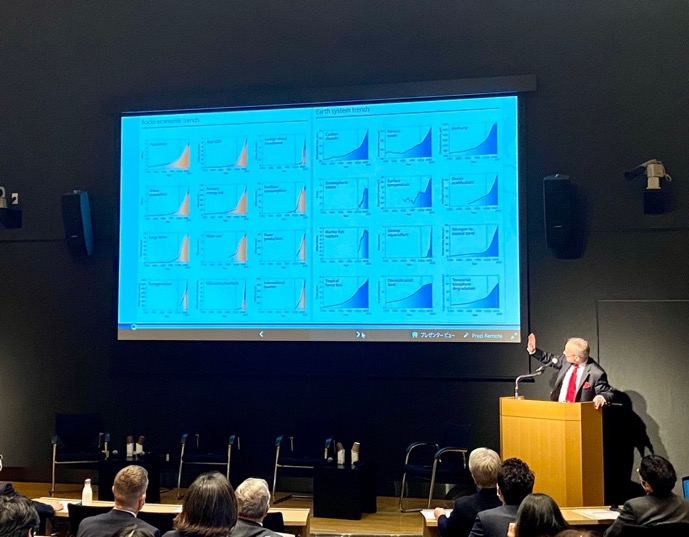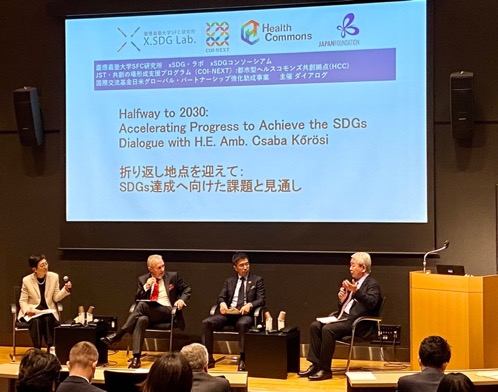Dialogue with H.E. Amb. Csaba Kőrösi
On February 16, 2023, the xSDG Laboratory and Consortium at Keio University, in collaboration with Japan Science and Technology Agency (JST)’s funding program COI-NEXT and the Japan Foundation Center for Global Partnership (CGP)’s Grant Program, organized "Halfway to 2030: Accelerating Progress to Achieve the SDGs". The event featured a dialogue with H.E. Mr. Csaba Kőrösi, President of the 77th United Nations General Assembly.
About the Speaker:
Mr. Kőrösi is a distinguished Hungarian diplomat who currently serves as the President of the 77th
United Nations General Assembly. Prior to this, he held the position of Director of Environmental
Sustainability in the Office of the President of Hungary. He has also served as Deputy State Secretary
responsible for security policy, multilateral diplomacy, and human rights for his home country. During
his tenure in New York, he was the co-chair of the intergovernmental process tasked with producing the
2030 Agenda for Sustainable Development and the Sustainable Development Goals. He brings a wealth of
experience and expertise to the conversation on accelerating progress towards the SDGs.
Brief Summary of the Dialogue
During the opening of the dialogue, Prof. Kanie, provided introductory remarks on behalf of the
organizers and introduced H.E. Amb. Csaba Kőrösi. As a member of the Independent Group of Scientists
(IGS) for the 2023 Global Sustainable Development Report (GSDR 2023), Kanie outlined three key points to
be discussed during the dialogue based on the GSDR 2023 processes:
- How can we accelerate the transformation towards the SDGs in the coming years?
- How can we use evidence to accelerate actions, and what evidence is necessary?
- What is the most effective way to promote better interactions between science, policy, and society?
These three points are crucial in achieving the SDGs, and the discussion centered on these topics will offer valuable insights and strategies for accelerating progress towards the 2030 Agenda for Sustainable Development.
Keynote Speech
H.E. Amb. Csaba Kőrösi urged the "Anthropocene" and the Great Acceleration of human activity as
background for the 2030 Agenda, including the SDGs, and reiterated the necessity of the transformation
to address the challenges that we are facing. He then introduced the progress of efforts to achieve the
SDGs, especially focusing on the seven goals that the progress has been particularly slow: hunger,
health, energy, employment, cities, oceans, and peace. He also addressed the various challenges that
facing in achieving the SDGs. In conclusion, he emphasized the need for transformation, not change.
Also, he emphasized that we should unite to create the rules necessary to achieve the SDGs and the 2030
Agenda, not strive for only as much as we can, while identifying the path needed to achieve it.
Panel Discussion
Following the keynote speech, a panel discussion was held with H.E. Amb. Csaba Kőrösi , Prof. Norichika
Kanie, and Akihiko Tanaka (President, Japan International Cooperation Agency (JICA)) under the
moderation Hiroko Kuniya (Project Professor, Graduate School of Media and Governance, Keio University).
The main points of the discussion are as follows:
Beyond GDP:
During a discussion on decision-making processes, H.E. Kőrösi pointed out that the Gross Domestic
Product (GDP) alone is not suitable for measuring development, as it fails to account for social, human,
and environmental dimensions. He emphasized the need for new thinking in economics, incorporating
different approaches to data gathering and analysis.
Conflict between the SDGs and rules:
When discussing the potential conflict between the SDGs and other international processes and goals,
such as climate change and biological diversity, Kőrösi stressed the importance of rule-making. He
suggested that changes need to be made to ensure that the goals and rules are in conformity, to avoid
contradictions.
Socially-robust Science:
Kőrösi introduced the concept of socially-robust science, which involves the production of scientific
knowledge rooted in real-world application. He noted that despite geopolitical divides, it's important
to nurture the responsibility and action of creating channels to implement global goals in concrete
terms. He also highlighted the need for an agreement within society on the advisory role of science in
policymaking, as science can act as a common language that brings people together.
Toward the Launching of the GSDR 2023:
Dr. Takeuchi expressed the hope that the next GSDR report will present entry points that guide the
scientific community on prioritizing goals to achieve the SDGs. Prof. Kanie highlighted the challenges
of collaborative writing, noting that it depends on individual capacities and resources are limited. He
stressed the need to pay attention to capacity, which is also valid for the GSDR in the next phase.
Promoting Collaboration between Science and Policy Communities, and UNGA:
Kőrösi emphasized the need for a consultation phase to establish accountability arrangements, inviting
experts from the field of science to discuss the main problems and challenges. He suggested that
scientists should be invited again towards the end of the negotiation process to review proposed
outcomes and validate implementation using a science-based approach.


